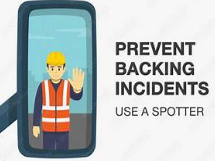There are two kinds of people in the world. Those who park head first and those who back in. The numbers of those who back in are increasing every day. Like most in the older generation, I park head first unless there is an unusual situation. If I am in a lot when I know everyone is going to be leaving at the same time, I will try to park so I don’t have to back out.
My first remembrance of people backing in was when I was working for US Senator Lowell Weicker on his campaign in 1982 and we used to visit factories at shift change. As soon as the factory whistle blew at Electric Boat or Remington Arms, the workers would explode out of the doors. He wouldn’t try to talk with them, just nod hello and shake their hands if they offered it. The point was to simply be seen. The people, freed from their shift, would race by, jump in their cars and pull out quick! Backing in on arriving at work made sense for them.
Today, in the morning when I go into work at the hospital, I am constantly having to delay parking while another car tortuously backs into a space ahead of me. There is no room for me to go around them. Maybe it says something about either my work ethic or the place I work that I want to get to my desk to start my day (or maybe I just want to get to the cafeteria to get my green tea and oatmeal). When I leave at the end of the day, since I make my own hours, there is no other traffic departing. While many work shift hours at the hospital, there is no factory whistle and no sudden exodus.
The other day in a shopping center lot I was trying to back out at the same time another car was trying to back into the spot next to me, which led to quite a standstill. Really, I felt like saying to the young woman, why do you need to back in?
A number of years ago, I ran a half marathon in Hartford, and in addition to being exhausted from the run, supplemented by a couple beers in the after-race beer garden, I walked to the parking garage where my car was. While I was trying to leave the garage, a woman was trying to back her car into a spot and was having quite a hard time doing it. I honked at her and held my hands up as if to say WTF? I wanted to get home and take a nap and she was blocking traffic in both directions. Just pull in already!
What does this all have to do with EMS? I’ll tell you. In all my years of writing this blog, the one post that elicited the most comments (back when I had open comments) and controversy was this short post in 2012:
For a number of years I worked some of my shifts in a town north of Hartford where I rode as the paid paramedic on a volunteer ambulance. A few of my partners were not that interested in the medicine part of the job. They saw themselves as drivers. No shame in that. We would race lights and sirens to an unresponsive or severe difficulty breathing, and then once we got there, my “driver” partners would try to back into the driveway so we could make a quick getaway. The problem was it took too long for them, in my opinion, to back in. Every second counts in EMS, right? So why delay 30 seconds, 60 seconds or several minutes to back in? We need to be at the patient’s side. EMS goes to the hospital only 8.5 % of the time on 911 calls that we respond to lights and sirens(according to 2023 Connecticut data). Why do we need to pull out so quickly so few times? On 91.5% of the calls, the emergency is over when we arrive at the scene. We do what we need to do to stabilize the patient, and only then do we take them to the hospital, unless it is a call that only the hospital can truly save, a patient needing emergency surgery for a gunshot wound for example. If the time backing in and the time backing out are the same, better to get to the patient quicker. If there is a need to back in to make loading and unloading the stretcher easier, take care of that later. Don’t delay getting to the patient’s side.
The comments I got on that post were mostly from people who claimed they could execute a perfect K-turn in a matter of seconds. Sure, come ride with me. I would like you as the wheelman or wheelwoman if you can do what you say. That was never my experience. Just pull in already, I would say to my partners. Either pull in or let me out first!
In the last many years I have just worked in the city, and there are not as many situations where we need to back into a drive. Lots of parking in the street or in a building parking lot. There are very few, if any long driveways like they have in the suburbs. And maybe now in the suburbs, it is not as big a problem since more of the younger people these days are backer-uppers (plus they have backup cameras nowadays), they may at least have some experience at it, and are less likely to cause too much delay. But still for me, when seconds (minutes even!) are supposed to count let me out first!

